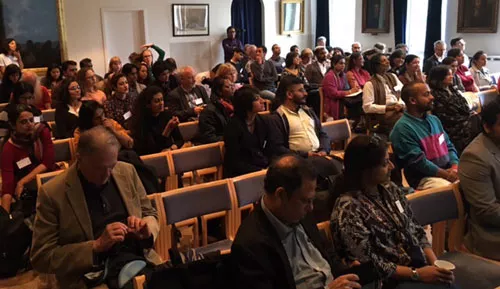Conference on Modernity (2016)
The Swedish South Asian Studies Network (SASNET) organized a conference entitled “Modern Matters: Negotiating the Future of Everyday Life in South Asia” at Lund University on 20-22 September 2016. The conference attracted more than 60 researchers, many from India, Pakistan, Bangladesh, Nepal and Sri Lanka.
This workshop explores what it means to consider oneself modern, or outside the limits of modernity, in an extremely diverse region. How is the notion of modernity experienced, contested, and negotiated in South Asia within the broader promise and hope of the Asian century? South Asian modernity will be considered in terms of regional, national, and global societies by pursuing the following, larger questions:
- Can we discover regional understandings of modernity in South Asia? If so, how do they differ, and what do they have in common?
- What are the specific discourses related to global modernity in South Asian societies?
- How are class, caste, ethnicity, religion, and gender related in contemporary South Asian societies?
- What resistance to modernity can we find in South Asian contexts? What categories are involved, and which arguments are raised?
- How might violence relate to South Asian modernity?
Eight panels
Panel 1. Religion and Modernity in South Asia
Chair: Clemens Cavallin, Religious Studies, University of Gothenburg, Sweden
Panel 2. Mapping Subaltern Modernities in Neoliberal India
Chairs: Alf Gunvald Nilsen, Kenneth Bo Nielsen and Anand Vaidya, Department of Sociology, University of Bergen, Norway
Panel 3. Beyond the Desirable: Critical Perspectives on Media-Modernity
Chairs: Britta Ohm, Institute of Social Anthropology, University of Bern, Switzerland, Per Ståhlberg, Department of Media and Communication Studies, Södertörn University, Sweden and Vibodh Parthasarathi, Centre for Culture, Media & Governance, Jamia Milia Islamia, India.
Panel 4. Staging Marriage and Modernity among the Middle Classes in South Asia
Chairs: Anindita Datta, Univeristy of Delhi, India and Ajay Bailey, University of Groningen, Netherlands
Panel 5. The Transformation of Caste
Chairs: Staffan Lindberg, Lund University & Neil Webster, DIIS, Copenhagen, Denmark
Panel 6. Youthful Modernities: Negotiating the Past, Present and the Future
Chairs: Ravinder Kaur, Indian Institute of Technology Delhi, India, Rajni Palriwala, University of Delhi, India and and Sonalde Desai, University of Maryland, USA
Panel 7. Women and Gender in South Asian Modernity: Vulnerabilities and Violence
Chairs: Ulrika Andersson, Lund University, Anna Lindberg, Lund University & Nishi Mitra, TISS, India
Panel 8. Open panel
SASNET organized an open panel for papers that did not fit any of the other panels but made an orginal contribution to understandings of modernity in South Asia.
Chairs: Henrik Chetan Aspengren, Linnaeus University & J R Jishnu, Kerala University, India
